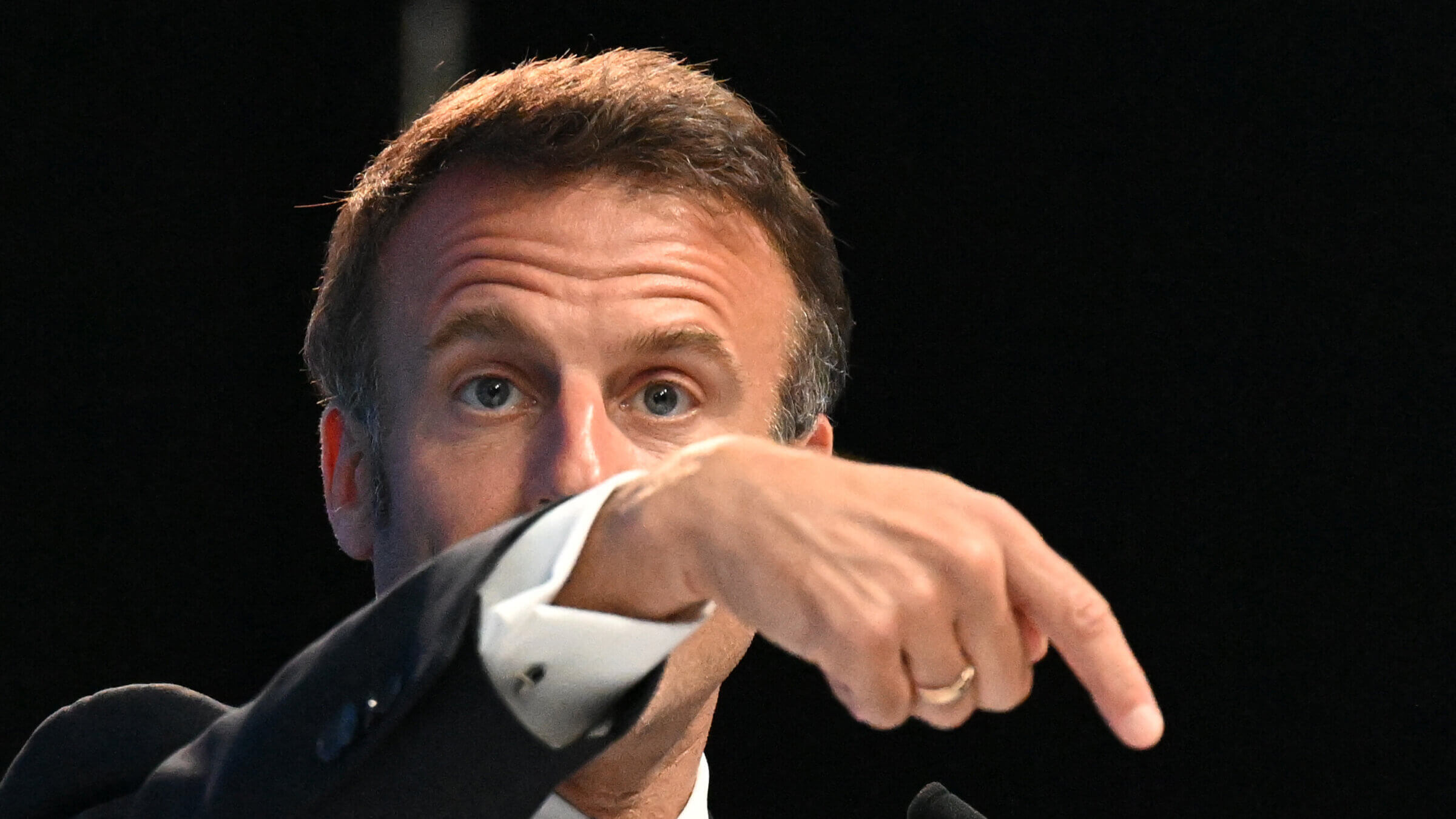Echoing the language of antisemites, Emmanuel Macron has started to embrace the D-word
Exactly what does the French president mean when he speaks of ‘decivilization’?

Emmanuel Macron delivers a speech at the Globsec regional security forum in Bratislava, Slovakia, on May 31, 2023. Photo by Getty Images
This year, the French government marked the arrival of D-Day two weeks early. This had nothing to do, however, with next week’s official commemoration next week of the 79th anniversary of the Allied landing on the beaches of Normandy. Instead, it had to do with the consternation President Emmanuel Macron caused last week when he declared that a “process of decivilization” now threatened France.
This D-word did not mean that totalitarian armies were massing on France’s borders. Instead, the phrase cropped up during a discussion with a small group of intellectuals Macron had invited to dine at the presidential palace. A few weeks before, he had ignited nationwide ire by enacting, against the wishes of most French and their representatives, a pension reform that included raising the retirement age from 62 to 64. Though the legislation became law last month, polls show that Macron remains as popular as British soccer hooligans at the Stade de France.
As a result, he was desperately looking for a way to pull himself out of the pit he had single-handedly dug. When one of his guests, reflecting on a series of recent, violent, but unrelated events in France, said they signaled a “processus de décivilisation,” Macron seized on the phrase. But what he thought was a political lifeline turns out to have been an ideological tripwire.
Though its paternity is obscure, the phrase is most closely identified with two European thinkers, Renaud Camus and Norbert Elias. Their ideas — one notorious, the other serious — their politics — one reactionary, the other liberal — could not be more different from one another. Indeed, the only thing they really have in common is the word “decivilization.”
In 2011, Camus published an essay titled Décivilisation. He had been, until then, a relatively obscure novelist and gay activist who made — and continues to make — his home in a refurbished 14th century castle in southern France. Camus’ restored pile of stone, once the home of local nobles — like earlier generations of French bourgeois, Camus ploughed his earnings into the pursuit of aesthetic and aristocratic pretension — reflects his obsessions in the essay. It is little more than a long sigh over the price paid by French society, denatured by centuries of democratic and egalitarian policies and politics. As the traditional (and undemocratic) sources of authority like the school, the church and the family slowly eroded, confusion and conflict assumed their place.
Yet this essay was a rehearsal of sorts for a second pamphlet Camus published that year, Le Grand Replacement. This phrase became a rallying cry for thousands, including Marine Le Pen, who became leader of her father’s extreme right-wing Front National in that same year, quickly placing it under new management as the Rassemblement National. The pamphlet, like Le Pen père et fille, has just one idea, which happens to be a wrong idea: namely, that the “indigenous” French population — white and Christian — is slowly being replaced by another and foreign population, brown and Muslim.

Of course, others including Tucker Carlson, the neo-Nazi marchers at Charlottesville in 2017, and the Australian man who murdered 51 people at a mosque in New Zealand in 2018, have echoed Camus’ baseless claim. Not surprisingly, Camus also dabbled in antisemitism. In the early 1990s, he declared there were too many Jews on culture programs broadcast by public radio stations in France — a problem, in his eyes, as Jews were disqualified by their “race” to experience, much less expound on French culture. (For the record, prominent French Jews like Alain Finkielkraut and, yes, Éric Zemmour have rallied to Camus’ defense, claiming that his words were ripped out of context.)
The other source for the notion of decivilization, Norbert Elias, was certainly qualified to speak to the experience of antisemitism. In 1933, the young German Jewish sociologist had the foresight to flee Nazi Germany and settled in Great Britain, where he wrote his most influential work, The Civilizing Process. Viewing the history of European societies through the prisms of the Freudian super-ego — which checks our passions — and the Weberian state — which monopolizes the means of violence — Elias traces how the painful internalization of evolving social norms makes us less willing to inflict pain on others.
Except, that is, when the opposite happens. How can one fit barbaric events like the Holocaust, which took the lives of Elias’ parents, in the grand scheme of civilization? Elias suggested that historical developments peculiar to Germany, especially the relative weakness of the central state, paved the way for what he called the “process of decivilization.” This explains, Elias argued, the “civilized barbarism” of the Nazi state, which harnessed its monopoly of violence to destroy those groups it deemed a danger to society. By the end of his life in 1990, Elias concluded that barbarism and civilization are less distinct and successive historical phases than they are the two sides to the same coin of human history.
Which denotation of decivilization, then, did Macron have in mind? Perhaps neither. Though the presidential aides subsequently claimed Macron was invoking Elias’ work, an account of the dinner conversation in the newspaper Le Monde suggests that neither Macron nor his dinner guests mentioned the names, much less discussed the works of either Elias or Camus. It may be that Macron thought, simply and sadly, the phrase would deflect public attention from the smoldering mess he had left behind with his autocratic handling of the reform bill.
Yet rather than deflect attention from the pension reforms, the phrase focused attention on Macron’s habit of poaching ideas from the ideological right. Not surprisingly, Marine Le Pen embraced Macron’s statement. “For years,” she declared, “I’ve warned against this country’s descent into savagery (ensauvagement), for which I’ve been called everything under the sun.” Finally, she exulted, “Macron agrees with us: decivilization is barbarism.” Other figures on the hard right, like Bruno Retailleau, have also used the terms “descent into savagery” and “decivilization” interchangeably and repeatedly.
Perhaps this choice of words would not matter as much in another time and place, but words very much matter in the particular time and place France (and the rest of the West) now finds itself. It is a time and place where, earlier this week, Macron publicly scolded his prime minister, Élisabeth Borne, for insisting the French must not “normalize” the ideas of Le Pen’s party. “While the Rassemblement National seems to play according to the rules,” she observed, “I still believe their ideas are dangerous.” With a glance back to Vichy, she warned that the RN is “the heir to Pétain.”
Remarkably, Macron in turn lectured Borne — whose father, a naturalized French Jew, survived Auschwitz only to take his own life several years later — that the millions of French who voted for Le Pen in the last presidential election were not “fascists.” (A valid and irrelevant point.) He also warned her that “moral arguments” against Le Pen were not helpful. (His words were, once again, applauded by Le Pen’s party.)
Let’s nevertheless suggest a moral argument in response to Macron’s words. We can do worse than one advanced by another (and far greater) writer named Camus. In 1947, Albert Camus published his novel The Plague, an allegorical account of the Nazi occupation of France. Towards the novel’s end, one of the characters, Jean Tarrou, tries to explain why he joined the resistance.
“I’d come to realize,” he remarked, “that all our troubles spring from our failure to use plain, clear-cut language. So I resolved always to speak — and to act — quite clearly, as this was the only way of setting myself on the right track.” Were he alive today, Camus might add that when one is a president, speaking clearly and truthfully not only sets oneself on track, but also sets the nation on track.
















